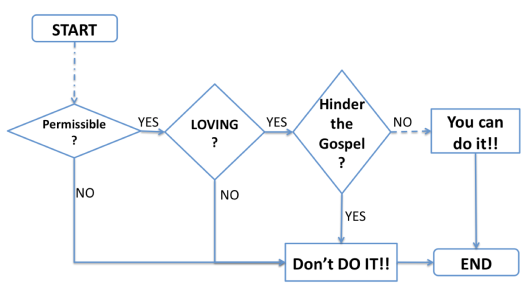Tags
 Should I eat that or not? What dress should I wear? Should I say that or not? Should I post this on my Facebook status? How should I respond to my parents’ nagging? Should I accept my friend’s invitation to go to that club? Should I engage in that kind of activity? Decision … decision … decision.
Should I eat that or not? What dress should I wear? Should I say that or not? Should I post this on my Facebook status? How should I respond to my parents’ nagging? Should I accept my friend’s invitation to go to that club? Should I engage in that kind of activity? Decision … decision … decision.
As Christians, we are free in Christ. “You will know the truth, and the truth shall set you free,” Jesus once said (John 8:32). However, why at times as a Christian, I feel like I am not free to do whatever I want? How do I actually exercise my freedom in Christ?
In 1 Corinthians 8, the Christians in Corinth are facing a similar dilemma: to eat or not to eat food sacrificed to idol. One group says it is okay, and for good reasons too. They know that all food is clean now that Jesus has declared it so. They are also fully aware that ‘an idol has no real existence’ and ‘there is no God but one,’ hence sacrificing to to idols actually does nothing to the food. Another group, however, because of their former association with idol worship, would rather puke than touch the food, or than even think about it. So, they did what any children would do. They asked Paul, their spiritual father – you might say, hoping for a simple ‘yes’ or ‘no’ answer. However, just like any good father would, Paul gave them a long lecture (recorded chapters 8 to 11), not just on whether it is alright to eat such questionable cuisine, but on the whole issue of how Christians should exercise their freedom in Christ.
Paul does affirm that it is okay to eat the food for the same reasons the all-you-can-eat Corinthian group gives. However, Paul says that just because they know it is permissible, it does not mean that it is buffet all year round. In chapters 8 to 9, Paul gives them at least two filters for them to consider before exercising their freedom in Christ.
In 1 Corinthians 8, Paul basically says, “Just because you know it is okay to do it, it does not mean you have to do it. Ask first: Is it loving? Is it building up your fellow Christians?” Intrinsically, it is not a sin in itself. However, if by exercising your freedom, you stumble your weaker brother, then you have sinned. That is one filter on how we exercise our freedom in Christ – a good one indeed. But that’s not all.
In 1 Corinthians 9, Paul gives them yet another filter – another good one too. This time, he uses himself as an example. He says that he has the right to be supported financially by the Corinthians for a number of reasons: The other apostles do it too (vv.5-6), it is just how it is supposed to be (v7), the law says nothing against it – if anything, the law endorses it (vv.9-11), and lastly, Jesus says it is okay (vv.13-14). Those are a good number of reasons, more than enough for him to exercise his right. However, for Paul, it does not pass one crucial filter. And because of that one filter, he decided not to make use of his right to receive support from the Corinthians. That filter is this: “Does it put an obstacle in the way of the gospel of Christ?” Paul would rather endure not exercising that right rather than become a hindrance in the way of the gospel.
So, in the way we speak, the way we dress, the way we behave around our workplace, the way we act among our schoolmates, the things that we post in our Facebook, the activities that we engage in, just because everybody is doing it, just because it feels natural or it is how it is supposed to be, just because it is lawful or the law endorses it, and just because Jesus says it is okay or Jesus does not say anything about or against it, it does not mean we should do it. We need to ask two extra questions before we exercise any of our rights. Firstly, toward our Christian brothers and sisters: Is it loving? Is it building up fellow believers? Is it stumbling other brothers or sisters? And secondly, toward our non-believing friends: Is it going to promote or hinder the gospel? Is it going to misrepresent the gospel? Is it going to put a doubt or confusion in their mind with regards to the gospel?
There are so much at stake than just our freedom or our rights. In Philippians 2:5-11, Jesus sets a prime example on this. As God, He has all the rights of God to do whatever He wants. However, instead of counting this right as ‘a thing to be grasped,’ he let go of those rights and took a form of a humble servant, and become obedient even to the point of death on the cross. Jesus forgoes his rights because of His love for us, and for the sake of the salvation of many. We would do well following in his footsteps.
ps. This post is adapted from my sermon delivered at CrossCulture Church on 10th January 2016. Thanks to Mark Hoo, the sermon and the PPT have been compiled and can be found here.
Related post(s):

interesting
Pingback: Flee in Order to Win | Sandy Citro
Pingback: Do All to the Glory of God | Sandy Citro
Pingback: Look before you do! | Sandy Citro